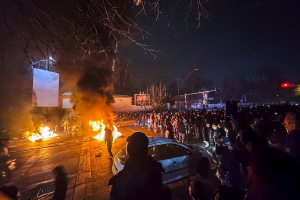Obama's 'Red Lines' on Syria Resemble Zebra Stripes
If zebras had pink stripes, they would resemble President Obama's "red lines" on Syria.
Obama's policy has communicated the following incoherent and spineless message: "In Libya we intervened to support liberty and prevent a bloodbath: Muammar Gaddafi threatened to hunt down his enemies, 'house by house, alley by alley.' Oh, is that what Basher Assad has been doing in Syria? Well, we can't intervene there because it's too risky. True, our isolationism could mean that the post-Assad Syria will -- as either a failed or Islamist state -- become Al Queda's next headquarters, but surely that can't be as bad as US intervention. Oh, are Syrians being slaughtered by the masses? Well, maybe intervention is justified on humanitarian grounds, but only if Assad uses chemical weapons. Tens of thousands killed by Assad's mortars, guns, tanks, scud missiles, and warplanes don't suffice. Oh, did the intelligence agencies of our allies (Britain, France, and Israel) conclude that Assad used chemical weapons? Well, we still need the international community to confirm these findings with a thorough investigation."
As he backtracked on the issue last week, Obama said, "We don't know how [the chemical weapons] were used, when they were used, who used them." White House officials have conceded that better information is obtainable only if the Syrian government allows international inspectors on the ground. But the notion of any cooperation from the Syrian regime is absurd in light of prior international efforts merely "to monitor" (much less inspect) anything in Syria. The Arab League observer mission, which started at the end of December 2011 and totaled 166 monitors, lasted about two months before security threats compelled its termination. Another toothless effort, the United Nations Supervision Mission in Syria established in 2012 (pursuant to UN Security Council Resolution 2043), involved about 300 unarmed military observers who also had to leave after two months because of safety concerns.
For Obama to obtain the kind of thorough investigation that would trigger his latest "red line," he would need to provide the very military commitment that he so obviously wants to avoid with his muddled Syria policy. So his legalistic backpedaling is just a cowardly admission that he's all talk on this issue – a fact that must be painfully obvious to the Syrian people.
Last Tuesday Obama cautioned against "rushing to judgment without hard, effective evidence" to avoid a situation in which the U.S. "can't mobilize the international community to support what we do." Apparently, for Obama the term "international community" means Russia and Iran, because those are the parties that would most oppose military action to halt Assad's butchery. The EU, the Arab League, Canada, and most of the rest of the world support efforts to end Assad's regime. Indeed, any hesitation from other members of the anti-Assad camp results mainly from fear of the powers backing Assad – a fear that becomes especially reasonable when even the world's only superpower flinches.
And if the use of chemical weapons is finally confirmed to Obama's satisfaction, what might he do? What Russia and Iran have done from day one of the conflict: pick a side and arm it. Two years later, the US administration may finally decide to supply weapons to those it has claimed to support for the last two years. Or maybe it can even muster the courage to do what tiny Israel has already successfully done twice: pinpointed airstrikes against Assad's military assets.
Whatever Obama finally does, it will look like too little, too late. During two years of US dithering, tens of thousands of Syrians have been tortured, slaughtered, or turned into refugees, with survivors wondering why they're any different from the Egyptians and Libyans who received robust US support when they sought freedom from tyranny. Obama's failure of leadership on the Syrian issue – and the bloody stalemate that resulted – has helped to spawn a new breed of battle-hardened terrorists. They, and Iran-backed terror group Hezbollah, are all in close proximity to one of the world's largest stockpiles of chemical weapons -- the kind of WMD that the intelligence community has obsessed about since 9/11.
Strategic blunders aside, US credibility has suffered a serious blow. Obama's "red lines" are more like pink zebra stripes. It turns out that Obama's "game changers" (declared last August) don't change the game at all – they just require new, tough-sounding terminology that can be fudged later.
Ironically, the US may now have to use military force more often to safeguard its interests because US threats will be more frequently dismissed. If we appear impotent on Syria (or North Korea), why should our principal antagonists on the world stage -- China, Russia, and Iran -- have anything to fear when their interests oppose ours?
Russia and Iran have prolonged the Assad regime's massacres, but they have also shown that their words and alliances mean something. The US has sent the opposite message: it quickly drops long-time allies when they're perceived as inconvenient (as with Hosni Mubarak) and cowers from backing the side it claims to support (as with the anti-Assad rebels in Syria). Even so-called allies don't take Obama so seriously: he can't even persuade Turkey to refrain from legitimating Hamas, a US-designated terrorist group, with a state visit to Gaza.
If nothing else, Obama's Syria mistakes offer a lesson: if you can't lead, at least stay silent to avoid diminishing American power with empty threats.



























